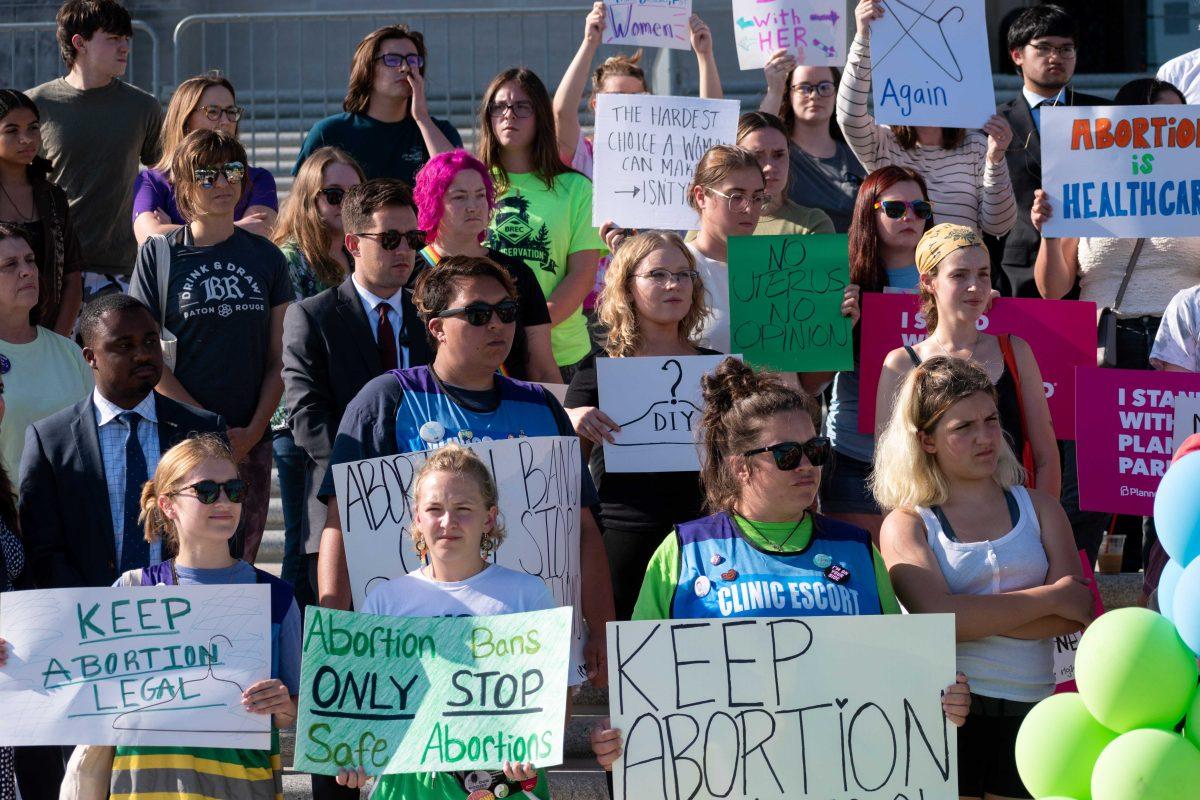I am a Christian woman, and I believe every pregnancy is created by God. I wish that no woman would ever feel the need to terminate her pregnancy.
However, I also believe God gave us free will, and in a country supposedly founded on the basis of freedom, women should not be stripped of their right to choose. While it is my job as a Christian to spread God’s word to others, it is not my job to condemn others for their personal choices.
The U.S. Constitution supports the separation of church and state, as our nation is a melting pot, filled with people from all walks of life and all religious beliefs. Our national government should not allow states to force women who are not Christian to obey commands given by a god that they do not believe in.
Our role as Christians is not to condemn, judge or force people into following God’s commandments, but to show them the unconditional love God has shown us and allow them to make their own decisions based on their own personal beliefs.
In case you missed it, the U.S. Supreme Court is currently ruling on a Mississippi law that, if upheld, would ban abortions after the fifteenth week of pregnancy. On Monday, May 2, a draft opinion upholding the Mississippi law and overturning the landmark 1973 case Roe v. Wade was leaked to Politico.
Roe put the right to abortion under the jurisdiction of the federal government, citing that a woman’s implied right to privacy was protected by the U.S. Constitution and therefore should be protected by the U.S. judicial system.
The leaked draft opinion suggests that because the Constitution does not explicitly support the right to an abortion, the issue should be left up to the states. While this may appear to be sound reasoning, the precedent it establishes is concerning.
The argument the draft opinion makes is that the word “abortion” or “privacy” are not written in our Constitution, so the national government should not regulate these issues. This argument leads us down a slippery slope. The words “contraceptives” and “same-sex marriage” are also not referenced in the Constitution, so if the federal government should only regulate things explicitly mentioned, we risk losing many more federal protections.
In the draft opinion, Justice Samuel Alito argues that this decision will not affect issues of contraception or same-sex marriage because abortion is unique in the fact that it involves pregnancy, but surely one can argue that contraceptives involve pregnancy. Birth control pills, IUDs, the morning-after pill and so many other methods of contraception can easily be attacked under the argument that they prevent potential life from forming.
If the Supreme Court follows through with its decision to strike down Roe v. Wade, states will be able to legislate women’s choices around terminating a pregnancy. In Louisiana, abortion is severely at risk.
Currently, abortions are allowed in Louisiana until the 22nd week of pregnancy, but Louisiana has something called a trigger law in place. This law states that if Roe v. Wade is overturned, abortions after the detection of a fetal heartbeat—typically around six weeks into a pregnancy—are prohibited.
These “heartbeat laws” are not uncommon in the U.S., and they are incredibly restrictive. At six weeks, many women do not even know they’re pregnant. According to the American Pregnancy Association, most women discover that they’re pregnant between their fourth and seventh week of pregnancy. For women who find out in their sixth or seventh week, they are completely stripped of the choice to terminate their pregnancy.
A common argument made for banning abortions is that “if you don’t want to have children, you shouldn’t be having sex.” However, this argument doesn’t account for the 1-in-5 American women who have experienced rape or attempted rape in their lifetimes. Louisiana’s trigger law provides no exceptions for victims of rape, forcing survivors to undergo a pregnancy they had no choice in and to be reminded of their assault every day for nine months.
Not only will the mother be emotionally affected by her pregnancy, but she will also be financially burdened by it. In Louisiana, a woman is not guaranteed paid maternity leave, so when a single woman is forced to give birth to a child conceived out of rape, she is then unable to provide for that child financially because she is not receiving any income. Many women cannot afford steep childcare costs, but they can also not afford to stay home from work. These policy failures make motherhood a fiancial struggle for many women.
Louisiana’s current trigger laws are frightening, but a recently proposed bill is even more restrictive, prohibiting abortions “at all stages of development prior to birth from the moment of fertilization.” This legislation would also punish abortion as murder.
The reason this bill is so important is that it could prohibit the use of the morning after pill, which is a form of contraception used after fertilization, preventing the implantation of the fertilized egg into the uterus. Birth control pills, while typically used to prevent fertilization, also work by preventing implantation of fertilized eggs. If this bill is passed and signed, the use of contraceptives in Louisiana will be under attack.
This attack will not only prevent women from making decisions about their own pregnancies but could also prevent women form using contraceptives as a form of medical care. While the most common reason women use birth control pills is to prevent pregnancy, 14% of users rely on the pill for noncontraceptive purposes; that’s roughly 1.5 million women. After pregnancy prevention, the most common uses of the pill include reducing cramps and menstrual pain, menstrual regulation, treatment of acne and treatment of endometritis. So, not only will overturning Roe v. Wade prevent women from choosing whether to have children, but it also opens the door for denying women basic healthcare.
While the Louisiana legislature seems to believe that banning abortions is the safest, most efficient way to stop abortions, research suggests that many other measures, like comprehensive sex education, decrease unwanted pregnancies and abortions.
The Journal of Adolescent Health reports that comprehensive sex education decreases not only unwanted adolescent pregnancies, but also homophobia and homophobic bullying. Comprehensive sex education also leads to increased awareness around child predation, STDs and relationship violence.
Louisiana is one of 20 states that do not require sex education to be taught in school. By no coincidence, Louisiana also has the third highest rate of STDs in the nation and one of the highest rates of teen pregnancy.
Our state must act proactively, not retrospectively, to prevent abortions and unwanted pregnancies. Louisiana’s refusal to implement comphrensive sex education is contrary to both research and the goal to decrease abortions.
If our lawmakers ban and criminalize abortions, they must also provide paid maternity leave, exceptions for cases of rape and incest and comprehensive sex education in schools. If legislators genuinely want to end abortion, they should ensure that women can afford to take off work to have children, and that young people understand the risks of unprotected sex.
If lawmakers are not taking every step possible to prevent unwanted pregnancies, then it is clear that their issue is not with abortions, but with women making decisions about their own bodies.
Mia Coco is a 19-year-old political communication major from Alexandria.
Opinion: Louisiana trigger law attacks women, not abortions
By Mia Coco
May 11, 2022
Baton Rouge residents and community leaders gathered on the capitol steps to protest the Supreme Court’s leaked early draft decision, May 3rd.







